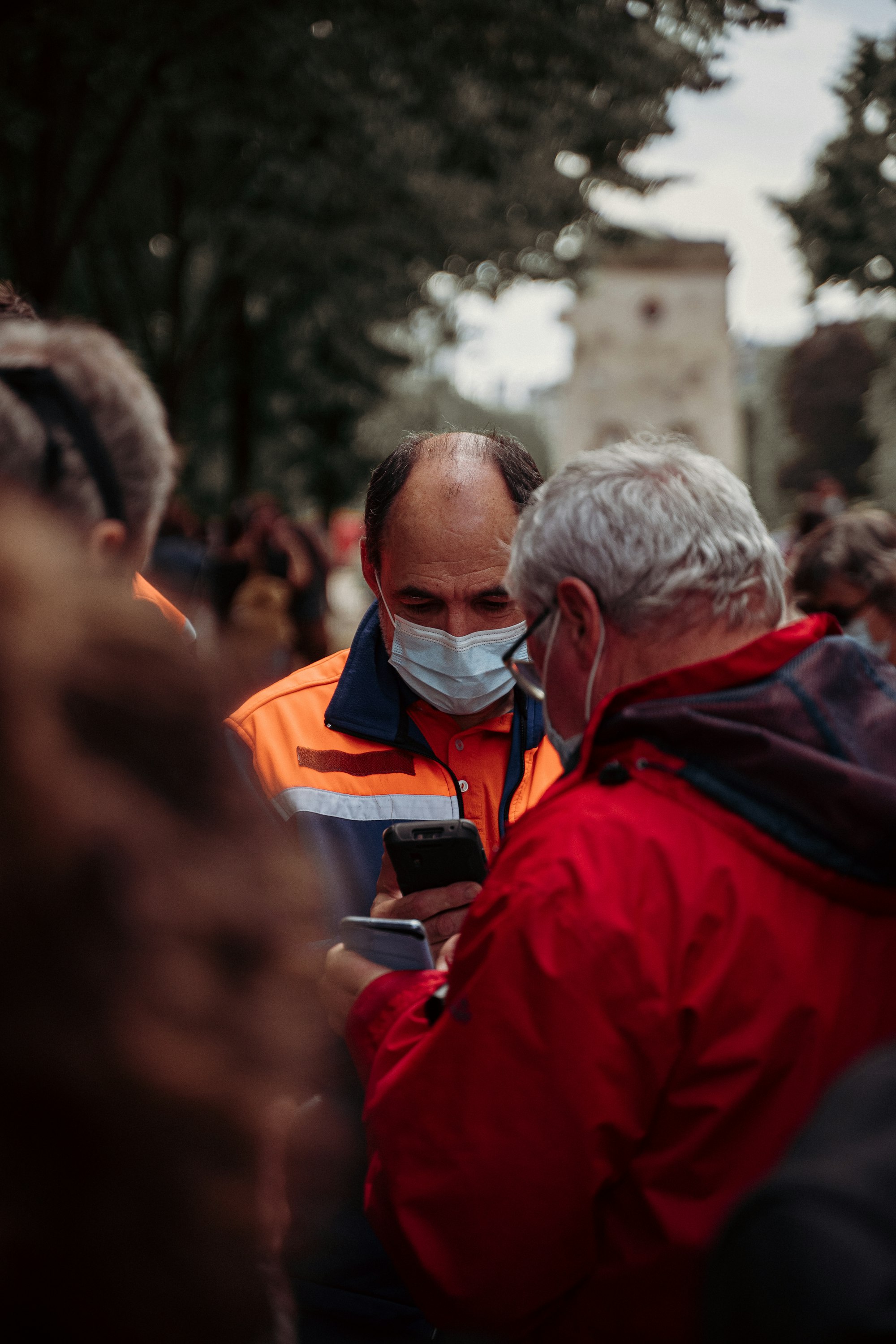Amidst a fourth wave of Covid-19, associated with the Delta variant, Israel had reintroduced and broadened its green pass regime in August 2021. Israel was the first country to enact a vaccine passport in February 2021 and the first to discontinue the regime four months later. In our earlier blog posts, we reviewed the previous green pass regime and its removal, discussing some rising concerns. The current regime, which is broader in its scope than the previous one, yields highly complex legal questions regarding the balance between the human right of non-vaccinated and public health considerations and the entrenchment of health-based distinctions.
Under the green pass requirements, a digital certificate is issued to those who were fully vaccinated, recovered, or were tested negative to Covid-19 within the previous 72 hours. Reinstated through a temporary provision, Israel’s current green pass policy was widened to additional spheres and imposed on specific groups of workers. First, a green pass is legally required not only to attend cultural, leisure, or sporting events as it was before, but also to join in-person classes in Israel’s higher education system or visit a library or a museum. In addition, places of worship with over 50 people gathering indoors must also comply with the green pass requirements. Second, workers in certain sectors are further mandated to present their employers with a green pass, including in primary and higher education, boarding schools, occupational training facilities, healthcare, and several public sector offices. At the same time, Israel slightly limited the age group on which it applies. All individuals above the age of three must present a green pass, a narrower policy compared with Israel’s initial green pass legislation that mandated a green pass from the age of one.
In light of the expanded green pass regime, the alternative of Covid-19 testing had become central, and Israel set up hundreds of rapid testing sites. At the same time, the State does not fund rapid Covid-19 testing for individuals who decided not to be vaccinated, including children above the age of 12 who are eligible to be vaccinated. The result may be that an unvaccinated child of 13, whose parents are unable to bear the cost of frequent tests, may be denied access to a library. Thus, the decision not to be vaccinated now comes with a price tag, in a way that may affect people’s autonomy over their body in ways connected to their social-economic status. Further, the cost of Covid-19 tests might discourage unvaccinated individuals from being tested, despite their increased vulnerability to Covid-19.
These questions are particularly pressing in the labour sector. In our previous posts, we highlighted the de facto impact of the green pass on the private market. While Israel’s previous green pass regime did not address the labour market, private employers used their prerogative to take measures and demand similar requirements as set in the green pass from their workers. Several decisions by the labour courts upheld these employers’ requirements, finding such restrictions as legitimate and reasonable in sectors where there is direct contact with vulnerable populations such as in education. Now, regulations apply the green pass requirements to specific labour market sectors, and there is also a governmental decision to broaden the scope of application to further sectors. However, a question remains as to whether the labour courts would view employer prerogative to apply green pass requirements in sectors not mentioned in the regulations as legitimate and reasonable. More problematically, the recent governmental decision instructs the Minister of Economy and Industry to promote a bill that would deny severance payments to individuals who do not act according to the green pass regime. The proposed bill will stipulate that these workers are to be regarded as having resigned from their jobs, rather than that they were dismissed. An additional crucial issue is the cost of Covid-19 tests, given the State’s decision not to fund tests for individuals who decided not to be vaccinated. With the workers paying themselves for these tests, this policy creates various challenges: the State has an interest that people would be tested so that they can work; and even more so, this policy has unequal implications for workers in low-income families who might face difficulties funding frequent tests. Under the current policy, more affluent workers have more autonomy in deciding whether to be vaccinated or not, and their right to work is more protected. Importantly, lower vaccination rates had proved interlinked with lower social-economic status.
The green pass legislation was challenged before Israel’s Supreme Court, in a petition arguing that this policy infringes upon the rights of non-vaccinated and is coercive and discriminatory. On 14 September 2021, the Court rejected the petition, holding that at its heart is a complex medical-professional issue and that the Court should therefore take a careful and restrained approach, especially with regards to the discretion of administrative bodies with the relevant professional expertise. However, the Court did address the petitioners’ argument that the green pass regime creates discrimination between people who are vaccinated (or recovered from Covid-19) and those who are not. The Court held that this distinction does not violate the right to equality, as it is a legitimate distinction between people with different circumstances. This determination was made in accordance with the professional information submitted to the Court about gaps between transmission and sickness between the different populations. The Court further pointed to the fact that the distinction is not based on any 'suspect classification' such as religion, race, nationality, and gender. The Court also stated that, given the alternative option of testing for Covid-19, the distinction created between the various populations is not very significant.
In its judgment, the Court held that it was convinced that the main purpose of the green pass is to reduce infection among the population, rejecting the petitioners’ argument that the purpose is to enforce vaccination. However, it added that if the green pass regime indirectly increases the rate of vaccination, then it is not improper, given that encouraging vaccination, rather then enforcing it, is legitimate.
Regardless of this judgment, the heated debate on Israel’s green pass regime is likely to continue.
A significant additional change is the announcement that as of 1 October 2021, the green pass will be valid only for those who received a third vaccination dose which Israel is the first country to administer. This announcement is concerning, first given the World Health Organization’s call for a moratorium on Covid-19 boosters until at least 10% of people in all countries have been vaccinated; and second, given the uncertainty regarding the protection that the additional booster adds to the fully vaccinated in different age groups. These are critical global justice and global health questions which rise from the decision to administer an additional booster, and to make it a requirement for the green pass, while many low and middle-income countries are waiting for vaccines. In Israel’s case, there is in particular the questions of its duties to the Palestinians under occupation, the vast majority of whom remain unvaccinated.
While the green pass is an important tool to reduce transmission and fight the spread of Covid-19, it creates vaccination-based distinctions that might reinforce structures of marginalization and exclusion. Vaccination-based policies must thus ensure not to exclude marginalized and disadvantaged individuals and communities, including with decisions regarding testing costs. In an article we co-wrote, together with our public health colleagues Nadav Davidovitch and Miriam Tabenkin, we reflected on the purposes of the green pass regime. We expressed concern that if it is used to encourage vaccination, rather than limited to the purpose of protecting public health, it might produce wider violations of human rights and undermine public trust needed in times of pandemics. This concern remains relevant in the face of Israel’s renewed policy, especially given the Court’s judgment that considered encouraging vaccination a legitimate purpose, at least as an indirect result of the policy. Even more so, we warned of the gradual expansion of health-based distinction. Israel’s green pass was initially implemented only on a limited number of public activities. Nonetheless, the legitimacy it gained had soon paved the way to widen this policy de facto and now de jure. Thus, it remains crucial to determine the purpose of the green pass policy and guarantee that measures are being taken based upon a sufficient factual basis and in a proportionate and context-specific manner.
This post was updated on 15 September 2021 to reflect the recent ruling by the Israeli Supreme Court.
TWEET


